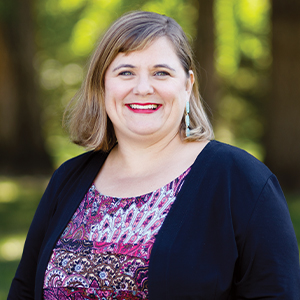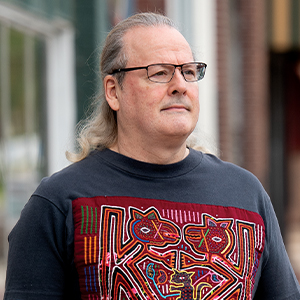Zuli Garcia, founder of Knock and Drop Iowa, wants people to feel safe and comfortable asking for help when they need it. To alleviate possible fears or embarrassment, she made sure nobody has to share personal information like paystubs or immigration status to access Knock and Drop services. Photographer: Emily Kestel.
Writer: Hailey Allen
If you have a fever, you see your doctor for a diagnosis. If you have a toothache, you ask your dentist if you have a cavity. If you need a new hairstyle, you consult with your barber or stylist on what looks best. Especially since the COVID-19 pandemic made everyone hyper-aware of their health concerns, many of us are accustomed to asking the experts for advice when we need help. We read instructions, follow pamphlets, search for YouTube videos, all without a second thought or hesitation, whenever we need answers.

When it comes to chronic hunger and food insecurity, this seemingly spirited instinct to seek help is extinguished. “In Iowa, only about 40% of adults aged 50 and older who are eligible for SNAP are actually enrolled,” Sarah Francis, an extension and outreach state specialist in nutrition and wellness at Iowa State University, said in reference to the Supplemental Nutrition Assistance Program. “That’s about 60% of older adults who are eligible for SNAP and not receiving it.”
Some of the most common reasons for food insecurity are lack of transportation to grocery stores, residing in a food desert and chronic health conditions that make mobility difficult. However, these reasons don’t explain why so many who qualify for assistance and additional benefits are simply not applying for them.
Psychological and social barriers are unseen reasons why people may continue to suffer from food insecurity, even when other physical barriers seem to have been addressed. All the food pantries in the world won’t benefit someone who is too proud to admit they need help. Experts told us psychosocial barriers to seeking help with food insecurity consist of two main categories: judgment from the social network and personal denial.
The Social Network
Culture in the United States is largely based on the “American Dream” ideal, and an individualistic “pick yourself up by your bootstraps” mentality. So it’s no wonder a stigma of shame and embarrassment exists around using food assistance programs like SNAP, or visiting soup kitchens and free food banks. The term “welfare” leaves a bad taste in the mouths of those steeped in this culture, Francis argues. For some, admitting the need for help and reliance on these programs can feel like a failure.
“You paid into the system [with taxes], you contributed, so it’s there for you,” Francis said. She tries to ease the reluctance of some to use a government program like SNAP by reframing it. “It’s like using a coupon — you save a little bit of money with it.”

Douglas Detrick, a licensed clinical social worker with the Des Moines Pastoral Counseling Center, sees this phenomenon firsthand and tries to reframe the cultural mindset by enlarging people’s worldview.
“Let’s say you have this veteran who has a lot of trauma, he can’t work for a period of time. Does he not deserve help? What if someone had a stroke? Don’t they deserve help? A lot of people haven’t been exposed to the ‘other side’ and have this false notion that people on welfare are all bad or that they’re less-than,” he explains.
Downplaying Needs
On the opposite side of the same coin exists a rationalization and denial of one’s food insecurity. Some think, “I don’t really need help, there are others struggling much more than me,” which is another myth brought about from “American Dream” idolization.
Even hardworking, full-time employees can struggle with food insecurity if they are also providing for others in their family. Rising inflation and stagnating wages, combined with the financial strain from the ongoing pandemic, have left many families struggling despite having a dual income.
According to a U.S. Department of Agriculture forecast from May, grocery prices are expected to increase between 7% and 8% by the end of 2022. That’s in addition to the price increases already in effect. Consumer price index data from March listed the cost of meat, poultry, fish and eggs at 13% higher since February 2021, and fresh fruit 10.6% higher.
“In our community, it is very hard for people to come forward and ask for help because they’re such hardworking individuals,” said Zuli Garcia, founder of the nonprofit organization Knock and Drop Iowa. Knock and Drop began as a way to assist the Latino community during the height of the pandemic. “Even when you have a salary. You have bills, but those are going up, gas is going up, food is going up, and people are having to decide between purchasing food for the week or filling their gas tank enough to get to work.”
Community Change
If stigma is the problem, awareness is the solution. In recent years we’ve seen the stigma around mental health rapidly decline as more people open up to asking for help and talking about their needs. The same principle would seem to apply here.
“The greatest thing that we can do is educate against stereotypes,” Francis said. That education starts with public services like hospitals, senior centers and food pantries.
People need to feel safe and cared for, not like they are being judged or that their status will be called into question, Garcia said. “We’ve had so many people say [Knock and Drop] is the happiest food pantry they’ve ever been at. And that’s the way it should be, it should be welcoming.”











